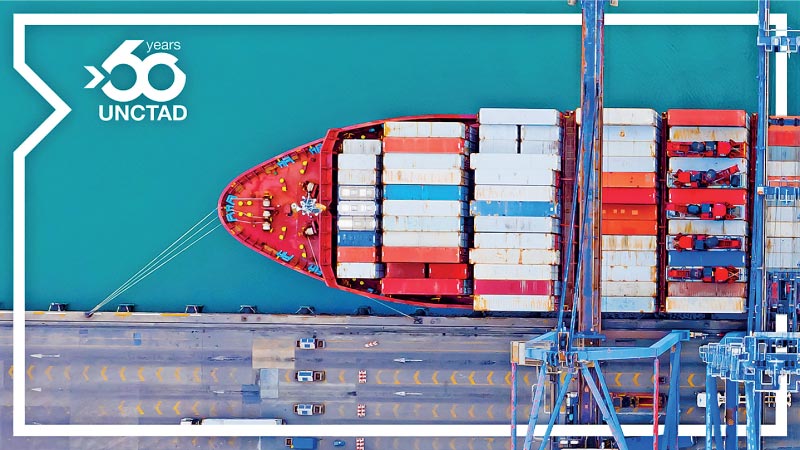Wednesday Feb 25, 2026
Wednesday Feb 25, 2026
Friday, 16 August 2024 12:28 - - {{hitsCtrl.values.hits}}

Developed by UN Trade and Development (UNCTAD), the Automated System for Customs Data, or ASYCUDA, revolutionises traditional customs processes by replacing outdated paper-based methods with efficient, secure, digital operations.
Initially created in response to a request from the Economic Community of West African States (ECOWAS), ASYCUDA was first implemented in Mauritania in the mid-1980s. Over the past four decades, it has helped more than 100 economies – from Iraq to Tajikistan to Tuvalu – speed up the clearance of goods and the pace of trade.
As UN Trade and Development celebrates its 60th anniversary, we highlight how this transformation has been crucial not only for simplifying customs clearance procedures but also for enhancing supply chain efficiencies, boosting public revenues, reducing corruption, streamlining humanitarian aid and combatting illegal trade worldwide.
“ASYCUDA has proven that it’s not just about managing customs data – it’s about fostering a resilient, responsive global trading environment,” UN Trade and Development Secretary-General Rebeca Grynspan says.
The software is currently active in every region, including 38 least developed countries, 23 landlocked developing countries and 41 small island developing states.
A toolbox of digital trade solutions
Success stories across the globe
Results on the ground highlight ASYCUDA’s impact on enhancing the efficiency of trade processes. Here are a few examples.
In the Americas
Jamaica: In 2020, a national electronic single window reduced the time for import and export permit approvals from three days to 24 hours, decreasing costs and boosting imports and exports by 29% and 28%, respectively.
Venezuela: ASYCUDA simplified the customs process from 30 steps to seven, cutting sea cargo release time from over 30 days to two, and air cargo from eight days to two hours. This change contributed to a 32% increase in trade transactions from 2022 to 2023.
Africa
Rwanda: Since 2015, faster clearance times have saved transporters $6 million and the economy $15 to $20 million each year. ASYCUDA has contributed to a 12% increase in trade transactions from 2022 to 2023.
The Gambia: One year after the 2022 rollout of ASYCUDAWorld, customs revenue in Africa’s smallest country increased by 23%. In 2023, the Gambian revenue authority reported collecting a record D15.6 billion, surpassing by 4% the government’s target.
Asia Pacific
Vanuatu: The Sanitary and Phytosanitary module has helped protect biodiversity by automating the process to apply for, approve and pay for certificates. The system also enabled the full tracking of goods shipped through the postal system. Previously, less than 5% of inbound and 0.1% of outbound goods were tracked. ASYCUDA has helped reduce customs clearance times from 3-5 days to 24 hours during peak seasons and boost the value of transaction by 26% between 2022 and 2023.
Timor-Leste: An electronic single window reduced physical trips between government agencies by 91% and cut printed documents by 85%. This not only streamlined processes and saved time but also reduced CO2 emissions.
Sri Lanka: The first country to implement eCITES, enhancing how it monitored the regulated trade of animals and plants. In 2023, the system processed over 1,000 permits with a rejection rate of about 6%. The processing time was cut from 5 days in 2020 to 43 hours in 2023.
Afghanistan: ASYCUDAWorld expedited humanitarian aid imports. Between August 2021 and December 2023, the system processed $2.6 billion in aid with cargo release times of one to two hours.
The Middle East
Jordan : Adopted ASYCUDA in 1997 and upgraded it in 2010. Leveraging the programme’s capacity building, the government built a national team that can now maintain and enhance the system without the need for external funding. Over 57,000 traders currently use ASYCUDAWorld in Jordan. In 2023, the government reported a 60% increase in thefcom value of annual trade transactions compared to 2010.
Lebanon: The day after the Beirut port explosion in 2020, ASYCUDA proved essential in the immediate response efforts, facilitating the rapid clearance of over 350 containers of relief and recovery supplies.
Forward together: Partnerships at the core
The updated version 4.4 of ASYCUDAWorld enhances risk management through its dynamic selectivity feature that uses data analysis to better pinpoint high-risk shipments for further inspection.
It also improves compliance with international standards, such as those set by the International Air Transport Association, by facilitating data submission in specific formats.
These improvements streamline customs procedures and strengthen the security and integrity of global trade networks, demonstrating ASYCUDA’s commitment to adapting to the evolving demands of international trade and supporting developing countries to tackle tomorrow’s import and export challenges.
Through its innovative solutions, ASYCUDA is setting a new standard for customs operations worldwide, demonstrating the profound impact of technology on global trade.